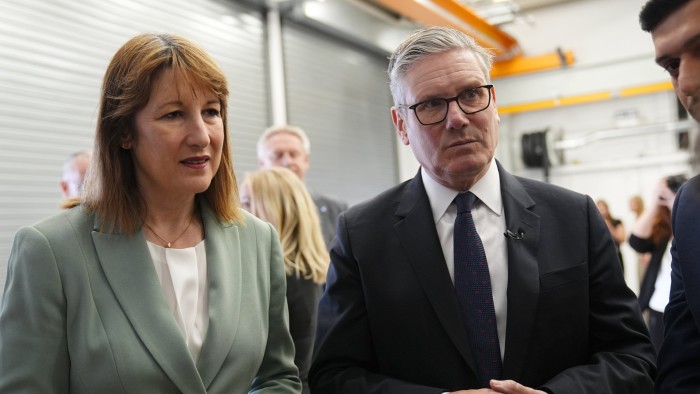This article is an on-site version of our Inside Politics newsletter. Subscribers can sign up here to get the newsletter delivered every weekday. If you’re not a subscriber, you can still receive the newsletter free for 30 days
Good morning. Thanks for the kind messages about yesterday’s newsletter by Jonathan Eley, the FT’s longform editor. I am very grateful to him for writing it and will pass on your lovely words.
Just me today. The government continues to count the cost of its defeat over the welfare bill — and one of those costs might yet be its chancellor. Some thoughts on that below.
Inside Politics is edited by Georgina Quach. Follow Stephen on Bluesky and X, and Georgina on Bluesky. Read the previous edition of the newsletter here. Please send gossip, thoughts and feedback to insidepolitics@ft.com
Deep cuts
Who is to blame for Labour’s welfare debacle? Jim Pickard and Anna Gross have an essential piece on all the names being bandied about. There are, I think, three groups worth thinking about, or, depending on how you count, 411 Labour MPs and/or the Downing Street staff.
Some in the government are blaming the 409 who are not called “Rachel Reeves” or “Keir Starmer”. This is funny because I’m old enough to remember when the 2024 intake was the most ruthlessly pruned, recruited and selected in the history of British politics, “Starmtroopers” who would vote with the leadership no matter what. Now, apparently, I learn they are all soft-hearted.
In the real world, Labour MPs have, since the election, voted to means-test winter fuel payments, to keep the two-child limit in place, and for very tight public spending settlements. They have voted to cut back foreign aid spending, a policy choice that cuts deeply against what most Labour MPs believe in and one that has caused, and will cause, real misery across the world. So the idea that Labour’s problem is that its backbench MPs lack the requisite mettle is, I think, wide of the mark.
The reason why the parliamentary party baulked at the £5bn of cuts to welfare is twofold. The first is, at risk of sounding like a stuck record, these cuts had absolutely no logic or reason to them. It’s really hard to get anyone to do anything if you literally don’t provide any intellectual justification for it. (It’s worth noting that the one cut that did pass, the cut to the health component of universal credit, is also the one cut that the government actually had a rationale for.)
A big part of the blame for that lies at the door of Reeves. As Robert Shrimsley writes in a terrific column, “her fingerprints are at the scene of almost all the incidents that Labour MPs believe to be foundational errors; from the now reversed move to means-test pensioner winter fuel payments to this week’s welfare revolt”.
Reeves has long wanted to curb the benefits bill. The abandoned £5bn of cuts were devised in the Treasury, not in the Department for Work and Pensions. The spending cuts represented about half of the government’s headroom of £10bn against its binding fiscal rule — to balance the current budget by 2029-30. But they lacked a coherent policy rationale, leaving MPs with little to offer concerned constituents beyond “that’s an awfully big number”. Reeves’ attempts to win back wavering MPs largely succeeded in hardening the resolve of would-be rebels.
Second, the Parliamentary Labour party has swallowed a significant number of politically difficult measures, a year has passed and the party is behind in the polls. There is no big-picture policy rationale coming from Downing Street or the Treasury about why and how these painful measures are going to get the government re-elected in 2029.
The blame for that lies at Starmer’s door. Outside of criminal justice, where the prime minister has a clear political project, he has consciously never set out what his project is and what he believes will get Labour re-elected in 2029. Again, if you don’t provide any reason for people to do something, they are not going to do it. Labour MPs didn’t understand the policy rationale for the welfare cuts because Reeves did not provide one, and they do not understand what the political strategy is for turning the country around by 2029 and how these mooted cuts fit into it because Starmer did not provide that either.
Now try this
I had a very nice lunch at a lovely new (or new to me at any rate) restaurant in the City of London: St Barts Restaurant, which does wonderful tasting menus.
I look forward to tackling your politics questions at 1pm today over on FT.com, with Robert and Miranda Green. Write to us in the comments here.




